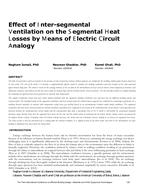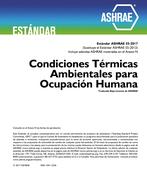Description
The flow characteristics and heat transfer in the presence of inter-connection between clothed segments are studied for the walking clothed upper human body part in cross wind. The aim of the work is to develop a computationally effective model to estimate the clothing ventilation and heat transfer of the inter-connected upper human body part. The model is based on the analogy between (i) the air flow in the microclimate air layer and an electric circuit composed of resistance and inductance elements, and between (ii) the heat losses from the human body and the thermal electric circuit resistance. The two developed model are coupled allowing the estimation of segmental heat losses generated at constant skin temperature. The coupled ventilation circuit and heat circuit models predicted both the segmental clothing ventilation rate and heat loss for different walking speeds and external wind. The developed model of the segmental ventilation and heat transfer from the clothed human segment were validated by conducting experiments on a walking thermal manikin at constant skin temperature using tracer gas method placed in an environmental chamber under windy conditions. The segmental ventilation and heat losses measured from the thermal manikin experiment were compared to the results of the ventilation-heat circuit model. Good agreement was observed between the ventilation-heat circuit model and the experimental data with a maximum error of 16 % which is still within the experiment standard deviation range. Results show that the segmental heat losses for the arm and the trunk attain its minimum for the lowest relative velocity and its maximum for the highest relative velocity. Evidently, when the relative velocity increases, the trunk and arm ventilation increase leading to an increase in segmental heat losses. The main reason is that the penetrated air is coming from the ambient condition. It is slightly heated in the fabric nodes and enter to the microclimate air layer leading to significant heat losses from the heated skin.
Citation: 3rd Intl Conf: Efficient Bldg Design
Product Details
- Published:
- 2018
- Number of Pages:
- 14
- Units of Measure:
- Dual
- File Size:
- 1 file , 2.5 MB
- Product Code(s):
- D-ICEB18-C016




